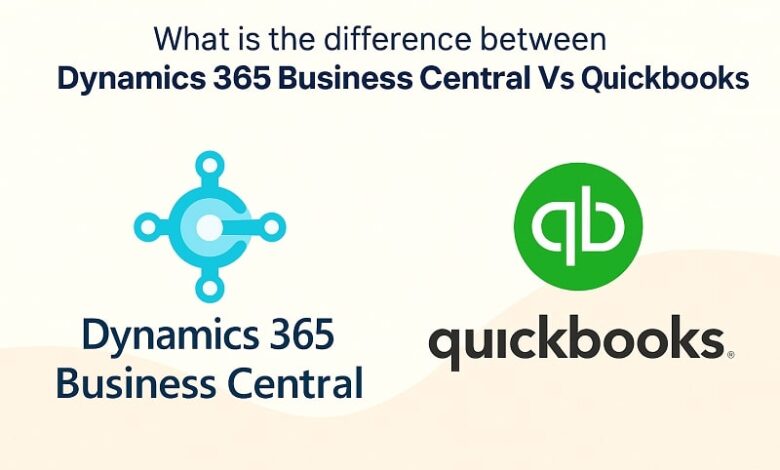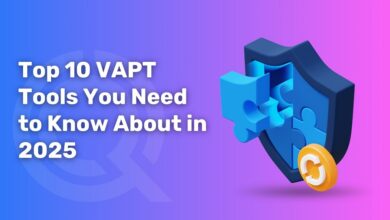What is the difference between Dynamics 365 Business Central Vs QuickBooks

The choice of the proper business software directly determines the effectiveness of the activities and the chances of growth. QuickBooks and Dynamics 365 Business Central are the products that are highly dissimilar in the sphere of financial control and one of which is tied to the convenience of accounting and the other one offers a comprehensive enterprise resource planning. The comparative analysis of the two platforms would be based on some of the key parameters including features, scalability, cost, and mode of deployment so that business owners could be aware of which solution would suit their current need and expansion plans in future.
QuickBooks Features
QuickBooks is an exclusive accounting software, which is targeted mostly at the small to medium sized companies that require a streamlined accounting software.
Core Accounting Capabilities
QuickBooks offers the necessary bookkeeping such as automatic classification of transactions, invoice creation, payments processing and simple financial reporting. The 2025 edition adds more automatic bank reconciliation features, which lessen the time to close the month.
Integration and Automation
QuickBooks is compatible with more than 1,000 third-party applications such as the major payment processors. The latest changes involve an AI-based invoice processing which automates the data capture and validation.
Deployment Options
QuickBooks Online is a cloud-native service, and QuickBooks Desktop may be run on-premises or hosted in the clouds by third parties.
Microsoft Dynamics 365 Business Central Features
Microsoft Dynamics 365 Business Central functions as a comprehensive ERP solution that extends beyond accounting to encompass complete business management across multiple departments.
Comprehensive Financial Management
Business Central provides advanced financial capabilities including multi-currency support across 30+ languages, sophisticated audit trails, real-time financial consolidation, and deep integration with Microsoft’s business intelligence tools.
Advanced Analytics and Reporting
Business central is natively connected with Power BI to provide powerful data representation and forecasting analytics. The platform offers real-time KPI, and customizable dashboards.
Global Scalability and Compliance
The platform supports operations across 170+ countries with built-in regulatory compliance and localization features. Multi-company management allows up to 300 individual company databases within a single environment.
Microsoft Dynamics 365 Business Central vs QuickBooks: Comparison Table
| Parameter | QuickBooks | Business Central |
| Complete ERP | No | Yes |
| Accounting | Yes, Basic | Yes, Advanced |
| Scalability | Limited | Yes, Advanced |
| Deployment | Cloud and On-premises | Cloud, On-premises, and Hybrid |
| Payroll Management | Yes, Add-on | Yes, Advanced |
| Reporting | Yes, Basic | Yes, Advanced |
| Data Security | Basic | Advanced |
| Track Business Activity | Yes, Basic | Yes, Advanced |
| Ease of Use | Yes, Intuitive | Yes, Advanced |
| Pricing | $30-$200/month | $70-$100/user/month |
| Customization | Limited | Extensive |
| Integration | Yes, Limited | Yes, Advanced |
| Multi-language Support | No | Yes (40+ languages) |
| Customer Support | Basic | Advanced |
Complete ERP
- QuickBooks: Offers also does not offer inventory and purchasing modules, sales order processing and production planning.
- Business Central: Combines finance, sales, purchasing, inventory, manufacturing, and service management on a single platform and removes a cross-departmental data silo.
Accounting
- QuickBooks: Automated classification of transactions, invoices, expense tracking and standard profit and loss and balance sheet reports, to keep the books easily.
- Business Central: Offers multi-entity merging, inter-company posting, detailed cost accounting and thorough integration with Power BI to allow real-time financial analysis.
Scalability
- QuickBooks: Recommended with a limited number of users, up to 50, and limited transactions per month, up to 1 000 a performance and reliability can be compromised.
- Business Central: Scales automatically to high-level performance at the enterprise level; supports an unlimited number of transactions and hundreds of simultaneous users.
Deployment
- QuickBooks: Desktop can be hosted on third-party clouds, though hosting may be necessary, online available as a cloud-native Online or desktop-installed Desktop; Desktop can be deployed atop third-party clouds.
- Business Central: Provides first-party cloud SaaS on Azure, on-premises deployment, or hybrid deployments with the same feature sets and provided redundancy.
Payroll Management
- QuickBooks: Offers payroll as a marketed addition which includes tax tables and direct deposit and end of year forms but with minimal allowance of customization and jurisdiction.
- Business Central: Incorporates native payroll and human resource modules that are configured to allow pay rules, global tax compliance, automated employee expense and time-off tracking.
Reporting
- QuickBooks: Creates non-customizable financial and operational reports; can be exported to Excel to manipulate.
- Business Central: Facilitates Power bi dashboard embeds, enables users to create custom reports on any data entity, and uses AI insights to trend, predict, and identify anomalies.
Data Security
- QuickBooks: Supports basic role-based permissions and standard encryption and best fits in small teams and has minimal audit logging.
- Business Central: Uses enterprise-level security that features AES-256 encryption, multi-factor authentication, scaled permissions by role/department, and detailed audit logs as a compliance control.
Track Business Activity
- QuickBooks: Invoice and payment status, recent transactions and simple user activity log, which is adequate in the context of small-scale control.
- Business Central: Visuals process flows end to end, approval chains, change history, system events in real time to provide detailed forensic analysis and SLA tracking.
Ease of Use
- QuickBooks: Characterized by a user-friendly design with guided installation, dashboards that are easy to read and with minimum training to the non-accountants.
- Business Central: Business Central developers provides a known Microsoft Office-like interface, with customizable role centres, Tell Me search help, and custom charts and tiles depending on the role of the user.
Pricing
- QuickBooks: Plans between $30 and $200 a month, and per-employee fees on the payroll; prices might increase dramatically with upgrades and number of users.
- Business Central: Pricing Subscription pricing: $70-100 per named user per month; Dynamics 365 applications may be bundled and volume discounts available to reduce total cost of ownership on large deployments.
Customization
- QuickBooks: Limits modify forms, reports and basic automations on workflow through default templates; no access to actual code.
- Business Central: Allows no-code extensions through the AppSource, low-code extensions through the Power Platform, and complete AL code development through custom functionality.
Integration
- QuickBooks: In-built connectors to support 1,000+ third party applications larger processes might require middleware to combine information.
- Business Central: Power BI is designed to be used with Office 365, Power Automate, Teams and additional modules in Dynamics 365; open APIs allow data to move both ways.
Multi-language Support
- QuickBooks: Mainly English interface; in some markets there are localized versions with no dynamic language switching.
- Business Central: Supports 40+ user interface languages and 170+ localization packs on global regulatory, tax and currency compliance.
Customer Support
- QuickBooks: Included email, chat and phone support; priority support with higher-level plans but not product support.
- Business Central: Offers 24/7 worldwide support via Microsoft and accredited partners, as well as access to consulting services, training and wide range of knowledge repository.
Conclusion
QuickBooks is an easy to use yet affordable accounting software used by small to medium-sized enterprises to perform basic financial processes. Dynamics 365 Business central is an ERP that supports growing organizations with the need to have full features of ERP, sophisticated reporting, and scale globally. Select QuickBooks when you require simple accounting and very low set up. Use Business Central when you require integrated operations, high levels of customization, as well as enterprise grade security to handle complex and multi-entity environments.






